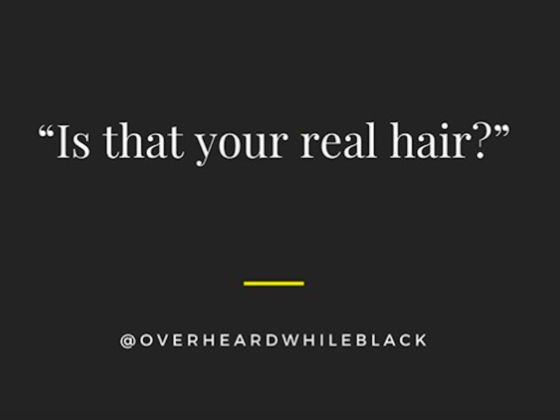The Overheard While Black Instagram account has simple and straightforward images of black boxes filled with white text. The effect is stark and unsettling. Each tile contains a microaggression hurled at a Black person, a seemingly offhand or flippant statement by clueless people who don’t understand the racism embedded in their everyday interactions with Black people. The repetition of tile after tile stamped with each statement drills home how common, and how damaging, these interactions are to the people who experience them everyday.

This Instagram Account Exposes the Microaggressions Black People Face Daily
“I thought you had a baby daddy.”
“I assume you’re paying for all this with food stamps?”
“You have a monkey brain. You need to give yourself a banana to calm down.”
Autumn Lewis, a public relations professional, founded the account on June 6. Overheard While Black already has more than 40 posts and 6,700-plus followers at the time of writing. The account speaks to a disturbing truth: Racist attitudes infect just about every office, grocery store, and neighborhood in this country. There is hardly a public space that can escape it.
“At almost every agency I’ve worked at, I’ve had some type of micro and even macro aggressions, whether it’s being told that I look more professional with straight hair, getting in trouble for wanting to take MLK day off, or overhearing a woman referring to us as ‘colored people,’” Lewis writes to me in an email. “Some of these might not be intentional, but these are all acts of racism.”
Lewis recalls that she first got the idea to call out microaggressions when her friends and some of her colleagues were shocked to hear about how she had been treated at work. They urged her to share her stories, so Lewis started the hashtag #overheardwhileblackinPR. But Lewis knew that Black people from all backgrounds and in every profession experienced similar microaggressions, and she had a feeling there were more people who would be willing to share their stories. So she expanded the hashtag into the Instagram account Overheard While Black.
“I’m tired of sweeping racism under the rug, I’m tired of receiving lower pay than my white colleagues, I’m tired of the micro insults… I’m just tired of it all,” Lewis says. “We’ve been treated wrong for centuries, and I got tired of people blaming it on Trump and saying it can all end with him out of office. People need to dig way back into history to get a better understanding of the mistreatments.”
In the short time the account has been active, Lewis has already received 300 submissions. The volume of submissions is troubling evidence that microaggressions are more common than we think, even in work places and community spaces where some of us would like to think no racism exists — and that they are deeply hurtful comments that sometimes result in ongoing trauma that Black people harbor over months or years. Lewis thinks the account has been “therapeutic” for Black people, who she hopes feel less alone in the fight against racism when they encounter her account. There’s an element of community to the Overheard While Black account; it’s become a space where Black people can share and commiserate over similar experiences.
“A lot of black people have thanked me and are sending me good energy because a lot of these submissions are truly heartbreaking,” Lewis adds.
White and non-Black people are paying attention: Lewis has received messages from people who “have asked questions about how and why some of these are considered offensive,” but she’s also seen evidence that “people have already checked their behavior and are trying to find ways to do better.” Some friends have even reached out to apologize for past comments. As for the non-Black people who have expressed anger or disbelief at some of the posts the account has shared, Lewis hopes that they can find the insight and self-awareness “to recognize their privilege.”
“Black people can live in a constant state of discomfort based on these everyday experiences and honestly… non-[B]lack people can stand to be a little uncomfortable to create a much needed change,” she says.
One reason Overheard While Black is so powerful is that it makes it clear that our society asks Black people to shoulder too much. Nothing about their behavior needs to change. It’s up to white and non-Black people to adjust our perspective and do our part to end this constant assault on the well-being and mental health of Black people. Part of what makes the account so powerful is that it’s a testament to how widespread racism still is. It’s also a living, growing record of what Black people must endure in their homes, their places of work, and even when they’re walking down the street. The account is a tribute to their resilience that shouldn’t even need to exist.
“I was feeling helpless with the protests and killings that were happening,” says Lewis. “I didn’t know what to do and it seemed like there was no end in sight. Now I see there is. We’ve gotten our voice back, we’re speaking up, and we’re working together.”